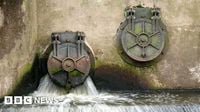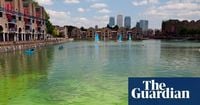On Saturday, July 19, 2025, Thames Water data revealed a troubling scene: dozens of storm overflows were actively discharging untreated sewage into waterways across London, the South East, and the East of England. This alarming development came just a day after the company was identified as one of the three major culprits behind the majority of water pollution incidents recorded in England during 2024.
A map on Thames Water's website showed 35 active discharges on that Saturday afternoon alone, with many more having occurred in the preceding 48 hours. One particularly concerning example was at Honeypot Lane, feeding into Kenton Brook, where a discharge had been ongoing for over seven hours and 40 minutes. These discharges mean that sections of these watercourses could be contaminated with raw sewage, posing environmental and public health risks.
The surge in sewage releases coincided with heavy rainfall across much of the UK, prompting the Met Office to issue yellow weather warnings for thunderstorms and rain. Forecasts predicted up to 90mm of rain in just two hours in some areas from Saturday through Monday, conditions that likely overwhelmed the combined sewage systems that process both rainwater and sewage.
Thames Water defended its operations by highlighting the Thames Tideway Tunnel, a 16-mile sewer running beneath the River Thames that opened in August 2024. The company claims the tunnel prevents half a million tonnes of sewage from entering the river annually. However, as the tunnel is still in its testing phase, some tests rely on particular rainfall amounts to be triggered, which may explain some of the recent discharges.
This latest episode of pollution follows a damning Environment Agency (EA) report published on July 18, 2025, which found that serious water pollution incidents in England rose by 60% in 2024 compared to the previous year. The total number of pollution incidents reached a record high of 2,801, up from 2,174 in 2023. Of these, 75 were classified as causing "serious or persistent" harm to fisheries, drinking water, or human health, a significant increase from 47 incidents in 2023.
The EA's data revealed that over 80% of these serious pollution events were caused by just three companies: Thames Water (33 incidents), Southern Water (15 incidents), and Yorkshire Water (13 incidents). Thames Water, in particular, saw its serious pollution incidents double from 14 in 2023 to 33 in 2024, making it the worst offender in the sector. Moreover, The Guardian reported earlier in March 2025 that Thames Water discharged 50% more untreated sewage into rivers than the previous year.
The Environment Agency attributed the rise in pollution to multiple factors, including persistent underinvestment in infrastructure, poor asset maintenance, and reduced resilience caused by climate change. The EA stressed that while wet weather can contribute to overflows, it does not excuse the "unacceptable number of incidents". Inspections carried out by the EA in 2024 found nearly a quarter of water company sites were in breach of their pollution permits, underscoring systemic failures.
Sir Geoffrey Clifton-Brown, chair of the Public Accounts Committee (PAC), condemned the government and regulators for being "missing in action". He criticized the regulators for being overwhelmed by prosecutions and failing to deter companies from unlawful actions. The PAC report highlighted that at current replacement rates, it would take 700 years to renew England's entire water mains network, a staggering figure that illustrates the scale of neglect.
Industry group Water UK acknowledged the sector's shortcomings but attributed the problems to regulatory constraints that suppressed investment. They pointed to Ofwat's prioritization of short-term bill reductions over long-term infrastructure resilience. However, a record £104 billion investment over the next five years has been pledged to upgrade the crumbling sewerage network, a move expected to increase average consumer water bills by £123 annually, with Southern Water customers potentially facing rises up to £224.
Environment Secretary Steve Reed described the pollution figures as "disgraceful" and a stark reminder of how years of underinvestment and weak regulation have led to sewage polluting England's rivers. He highlighted government actions including banning unfair bonuses for polluting water bosses, introducing jail sentences for pollution offenses, and securing the historic investment in infrastructure upgrades.
Reed is expected to announce a "root and branch" reform of the water industry on Monday, July 21, 2025, coinciding with the release of a landmark review led by Sir Jon Cunliffe, chair of the Independent Water Commission. The review is anticipated to recommend significant changes, including the possible abolition of Ofwat, the current water industry regulator, amid widespread criticism of regulatory failure.
Sir Jon Cunliffe has previously voiced concerns over "deep-rooted, systemic and interlocking failures" within the sector and regulators. He advocates for a regulator that is more proactive and continuously monitors water companies, similar to the financial services model, enabling early intervention and support.
Environmental campaigners have been vocal as well. James Wallace, CEO of River Action, called the situation a "national disgrace" and urged that Thames Water be placed into special administration to reset its operations. The government’s Water (Special Measures) Act, introduced last year, grants the watchdog stronger powers to take swift action against polluting companies.
Beyond sewage spills, ministers have promised to tackle all sources of water pollution in England and Wales. Environment Secretary Reed emphasized that agricultural runoff and road pollutants also heavily contaminate waterways. Runoff from farms, rich in animal waste and fertiliser residues, contributes to high nitrogen and phosphorus levels, triggering toxic algal blooms. Road runoff introduces oils, chemicals, and residues from tyre and brake wear, worsened by heavy rains.
An analysis by the Independent Water Commission found that 45% of water bodies in England are affected by agricultural pollutants, slightly more than the 44% impacted by the water industry's runoff. Nearly 20% of water bodies suffer contamination from road and transport pollutants. Ministers plan to introduce new measures to limit pollution from mining as well, another persistent but less visible source of contamination.
The political pressure is mounting. Polls show strong public support for re-nationalizing the water industry and for jailing water executives responsible for pollution, though the government has ruled out nationalization. The Liberal Democrats have made water pollution a central theme in their recent election campaigns, highlighting the urgency of cleaning up rivers, streams, and coastal waters.
As the UK faces increasing climate challenges and growing environmental concerns, the coming reforms and investments mark a critical juncture for the water sector. The hope is that these measures will not only curb the alarming rise in pollution incidents but also restore public trust in the stewardship of the nation's precious waterways.





